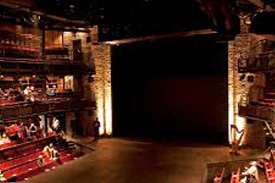 Superstition is something everyone is familiar with, regardless of whether they give it value or not. For dancers, holding superstitions is more commonplace, whether it is completing the same pre-show routine or touching a certain spot in the theatre before they go on stage, as for them this guarantees their performance in some way personal to them. This unspoken agreement or deal the dancer does with the theatre is something born from the same deal between the audience and performer, in suspending disbelief in the name of theatre and entertainment.
Superstition is something everyone is familiar with, regardless of whether they give it value or not. For dancers, holding superstitions is more commonplace, whether it is completing the same pre-show routine or touching a certain spot in the theatre before they go on stage, as for them this guarantees their performance in some way personal to them. This unspoken agreement or deal the dancer does with the theatre is something born from the same deal between the audience and performer, in suspending disbelief in the name of theatre and entertainment.
General superstitions can include things like a black cat crossing your path (meaning something bad will happen), a broken mirror resulting in seven years of bad luck and the same for walking under a ladder. It is said that superstitious beliefs attached to the theatre originated in the cities of Europe, particularly where ballet predominated. Even today these theatres have associated superstitions and ghost stories, which some dancers – but not all – particularly invest in.
Some say there should always be a light left on in an empty theatre, which can be to either ward off ghosts or just provide the ghosts with enough light to see. Failure to provide this may anger the ghosts, leading to pranks and other mishaps, and some in the theatre community think it is better to be on the safe side and leave a light on just in case. A less extreme case is the belief that a good dress rehearsal will bring bad luck for the performance itself. For plays, it is also deemed unlucky to speak the last line of a show before the production opens.
Perhaps the best known superstition surrounds wishing a performer good luck. Doing so before a performance is considered very unlucky, so one should say “break a leg” to an actor, which is symbolic of “taking a bow” at the end of a worthy performance, and wish a dancer “merde”, which – through historic tradition – equates to “watch your step”.
